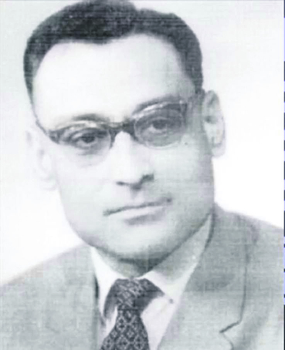Inter Services Selection Board may refer to:
- Inter Services Selection Board (Bangladesh), military organisation in Bangladesh
- Inter Services Selection Board (Pakistan), military organisation in Pakistan
Inter Services Selection Board may refer to:

Agha Muhammad Yahya Khan was a Pakistani military officer, who served as the third president of Pakistan from 1969 to 1971. He also served as the Commander-in-Chief of the Pakistan Army from 1966 to 1971. Along with Tikka Khan, he was considered the chief architect of the 1971 Bangladesh genocide.

The Bangladesh Armed Forces are the military forces of the People's Republic of Bangladesh. They consist of the three uniformed military services: the Bangladesh Army, the Bangladesh Navy and the Bangladesh Air Force. The Armed Forces are under the jurisdiction of Ministry of Defence of the Government of Bangladesh, and are directly administered by the Armed Forces Division of the Prime Minister's Office. The President of Bangladesh serves as the Commander-in-Chief of the Bangladesh Armed Forces. Bangladesh has the third-largest defence budget in South Asia, The Bangladeshi military is the 37th strongest in the world and the third most powerful military force in South Asia. Border Guard Bangladesh and Bangladesh Coast Guard are under the jurisdiction of the Ministry of Home Affairs. during peacetime, but during wartime they fall under the command of Bangladesh Army and Bangladesh Navy respectively.
A cadet is a student or trainee, and is typically used in military settings to denote an individual undergoing training to become commissioned officers. Several civilian organisations, including civil aviation groups, maritime organisations, and police services, also designate their trainees as cadets.

Brigadier Siddique Salik, SI(M), was an officer in the Pakistan Army. He was a combat artist, humorist, novelist, and a memoirist who served as 8th Director-General of the Inter-Services Public Relations from 1985 until his death in 1988 in the plane crash in Bahawalpur with then President.

Victory Day is a national holiday in Bangladesh celebrated on 16 December to commemorate the defeat of the Pakistan Armed Forces in the Bangladesh Liberation War in 1971 and the Independence of Bangladesh. It commemorates the Pakistani Instrument of Surrender, wherein the commander of the Pakistani Forces, General A. A. K. Niazi, surrendered to the Mukti Bahini and their Indian allies, ending the nine-month Bangladesh Liberation War and 1971 Bangladesh genocide and marking the official secession of East Pakistan to become the new state of Bangladesh.
Operation Tupac is the codename of an ongoing military-intelligence contingency program that has been active since the 1980s and run by Pakistan's main intelligence agency Inter-Services Intelligence (ISI). It has a three-part action plan to provide covert support to anti-India separatists and militants in the insurgency in Indan-administered Jammu and Kashmir. The program was authorized and initiated in 1988 by the order of the then-President of Pakistan, Muhammad Zia-ul-Haq.

Bangladesh Railway is the state-owned rail transport agency of Bangladesh. It operates and maintains all railways in the country, and is overseen by the Directorate General of Bangladesh Railway. The Bangladesh Railway is governed by the Ministry of Railways and the Bangladesh Railway Authority. Its reporting mark is "BR".

Pakistan Military Academy, also referred to by its acronym PMA, is an officers training centre located near Kakul village in the city and district of Abbottabad, Khyber Pakhtunkhwa. Established in October 1947, it is the sole service academy in Pakistan tasked with training cadets to serve as army officers. For educational training, the institution is accredited by the National University of Sciences & Technology.

Dhaka Cantonment is a Cantonment located in the northern part of Dhaka, Bangladesh. The headquarters of the Bangladesh Army and Air Force are situated within the cantonment which combined form the Armed Forces of Bangladesh. The Cantonment is located on the north-east end of Dhaka.

Rameshwar Nath Kao was an Indian spymaster and the first chief of India's external intelligence agency, the Research and Analysis Wing (R&AW) from its founding in 1968 to 1977. Kao was one of India's foremost intelligence officers, and helped build R&AW.

Cadet college is a special military high school system of British Raj and later, Pakistan and Bangladesh.
Raza Muhammad is a retired two-star general of the Pakistan Army, and has served as the High Commissioner of Pakistan to Mauritius. He was concurrently accredited to Republic of Seychelles, Republic of Madagascar and Union of the Comoros. Raza has also been awarded Hilal-i-Imtiaz (Military) for his meritorious services to the Islamic Republic of Pakistan.
He is currently serving as President Islamabad Policy Research Institute (IPRI). Earlier, he was an Advisor to President National Defence University (NDU) from 2019 to 2022. He had also served in Army Welfare Trust (AWT) as an Executive Director(Services).

The Inter-Services Selection Board is a committee for the selection of commissioned officers in the Pakistan Armed Forces: the Army, the Navy, and the Air Force.

Pakistan continues to enjoy a privileged status in the Organisation of Islamic Cooperation. In terms of population, it is the OIC's second largest member. Pakistan is the only Muslim country to have detonated nuclear weapons, has the sixth-largest standing military force in the world and a large labour workforce working in various Muslim countries.

The Pakistan Army Medical Corps is a military administrative, combined arms, and the combat support branch of the Pakistan Army, mainly concerns with the military medicine and move of army in the war providing medical and combat support

The Joint Staff Headquarters, is the military headquarters of the Pakistan Armed Forces at the vicinity of the Chaklala, Rawalpindi, Punjab in Pakistan.

The Ministry of Defence (MoD) (Bengali: প্রতিরক্ষা মন্ত্রণালয়) is a Bangladeshi government ministry. The MoD is headed by the Minister of Defence, a civilian and member of cabinet. The post is usually held by the Prime Minister of Bangladesh, who also serves as the President's second-in-command of the military. The MoD exercises supreme command authority over the Bangladesh Armed Forces.

Khwaja Wasiuddin (1920–1992) was an army general and diplomat. He started his career as a young officer in the British Indian Army and later became a senior general in Pakistan Army. He was the permanent representative of Bangladesh to the United Nations.
The acronym ISSB may refer to the following organizations:
Bleed India with a Thousand Cuts is a military doctrine followed by the Pakistani military against India. It consists of waging covert war against India using insurgents at multiple locations. According to scholar Aparna Pande, this view was put forward in various studies by the Pakistani military, particularly in its Staff College, Quetta. Peter Chalk and Christine Fair cite the former director of the Inter-Services Intelligence (ISI) explicating the strategy.